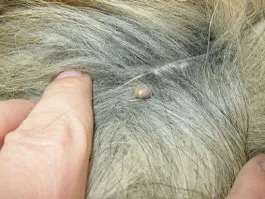Tick fever, also known as canine ehrlichiosis, is a severe illness caused due to ticks affecting dogs globally.
Tick fever occurs when a specific species of ticks transmits an organism named Ehrlichia, showcasing various symptoms that become deadly and life-threatening if not addressed.
What is tick fever in dogs? This is crucial for you to understand, if you wish to provide necessary care, prompt diagnosis, and planning effective prevention strategies.
In this article, we will delve deep into its meaning, symptoms, causes & more to help you make informed decisions whenever required.
So let's jump in!
What is Tick Fever in Dogs?
Tick fever is a deadly disease caused by the bacteria name Ehrlichia occuring due to the bite of infected ticks.
These ticks, such as the brown dog tick, and the lone star tick, act as vectors for the Ehrlichia organism.
Once the organism enters the white blood cells of a dog, your dog will start to face a cascade of health problems.
What Causes Tick Fever in Dogs?
As mentioned above, an organism named Ehrlichia can cause tick fever, sometimes accompanied by Ehrlichia chaffeensis and Ehrlichia ewingii.
Types of tick fever in dogs
Ehrlichiosis
Anaplasmosis
Rocky Mountain Spotted Fever (RMSF)
Babesiosis
Lyme Disease
Hepatozoonosis
Cytauxzoonosis
Symptoms of Tick Fever in Dogs
Tick fever in dogs symptoms can vary depending on the severity.
Some dogs might not show any symptoms for a period of time.
But, there are few common symptoms, you should keenly observe:
1. Fever
The initial sign may begin with high fever, which wont reduce even after administering fever reducing medication.
2. Lethargy
Do you feel like your dog has become weak, lethargic and seems disinterested in the activities once they enjoyed themselves?
If yes, there is a high chance that your dog is infected with tick fever.
3. Loss of Appetite
Has your dog lost weight & is starting to look malnourished due to the loss of appetite?
Your dog is likely infected by tick fever.
4. Swollen Lymph Nodes
Swollen lymph nodes, especially around the neck, can be a sign of the disease.
5. Joint Pain
Has your dog stopped moving freely due to joint pains and stiffness?
If yes, your dog has probably got infected.
6. Nasal and Ocular Discharge
Like humans, dogs can also have nasal and ocular discharge with cough.
7. Bleeding Disorders
If the case is severe, you might see your dog bleeding from the nose, gums and even through urine or stool.
8. Neurological Symptoms
Although rare, your dog might face seizures or other neurological issues due to the tick fever infecting the nervous system.
Diagnosing Tick Fever
For effective treatment, prompt diagnosis of tick fever is crucial. Veterinary might advise you to perform a few diagnostic tests:
Blood Tests
Doctors may prescribe you a few tests, such as PCR (polymerase chain reaction) and serology, helpful in detecting Ehrlichia organisms or antibodies in the dog's blood.
Complete Blood Count (CBC)
This test is necessary if one wants to evaluate a dog's overall health and if there is any change in the count of white blood cells.
Chemistry Panel
Usually done to assess organ function & to identify any abnormalities associated with tick fever.
Tick Fever in Dogs Treatment
Involves the combination of supportive care & antibiotics & the common treatment steps include:
1. Antibiotics
One of the most common antibiotics used is Doxycycline, administered over several weeks to eliminate the organism.
2. Supportive Care
Your dog may need supportive care, which might include fluid therapy to address dehydration and other symptoms, along with medications to control fever and pain.
3. Blood Transfusions
In case of severe blood infection or blood loss, your dog might require blood transfusion.
4. Monitoring
Closely monitoring your dog during treatment is crucial to stop your dog's health from deteriorating rapidly.
Prognosis for Dogs with Tick Fever
The prognosis for dogs with tick fever varies depending on several factors, including the severity of the disease at the time of diagnosis and the dog's overall health. With prompt diagnosis and appropriate treatment, many dogs can recover fully. However, if left untreated, tick fever can lead to severe complications and even death.
How to Prevent Tick Fever in Dogs
Prevention is better than cure! Below we are sharing six steps to help you reduce the risk.
1. Tick Control
Check your dog for ticks after every outdoor activity and use preventive products like tick shampoo, and sprays, according to veterinarians recommendations.
2. Tick-Infested Areas
Stop your dog from getting near other stray dogs, and keep your yard well maintained, free of any tall grass and bush.
3. Tick Checks
Ensure to check your dog for ticks and try to remove the entire tick along with its mouthparts.
4. Vaccination
Plan a vet visit and get vaccinations administered to fight against the Tick-borne diseases.
5. Regular Vet Visits
Plan vet visits whenever required to assess your dog's overall health and preventive measures.
6. Educate Yourself
Try to learn all types of ticks and the harm they can cause. Remember that awareness is a vital part of prevention.
Conclusion
One should not take tick fever lightly as it can seriously affect our beloved canine companion.
To become a responsible pet owner, you should proactively understand the symptoms, causes, diagnosis, treatment, and preventive measures.
Planning a vet visit as soon as your dog displays and any symptoms is crucial to keep your furry friend healthy & happy for years to come.
Always consult your veterinarian as and when required for guidance tailored to your specific dog and geographic region.






0 comments:
Post a Comment